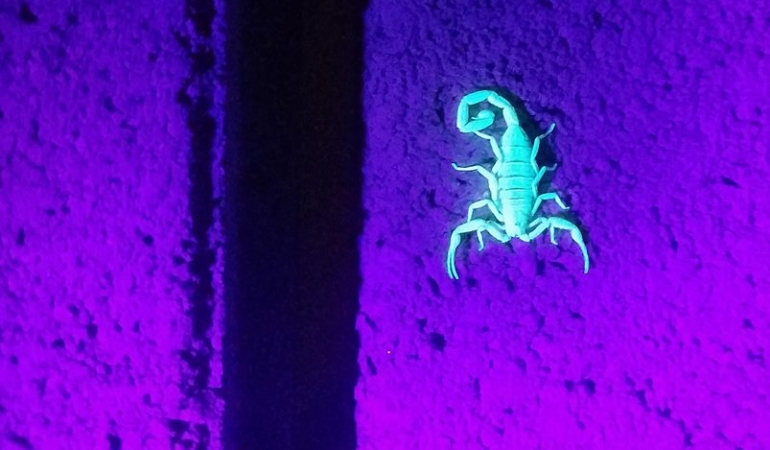12 Things to Know About Dealing with Scorpions in Arizona
Our family business has always been bugs. Growing up, my dad owned a pest control business, so I’ve been around bugs my entire life. I can vividly remember when I was little, my dad would bring home jars of scorpions, spiders and all kinds of things that he would catch while out working. He would place them on the kitchen window seal (I’m sure my mother just loved that!) and teach us about them.
While I never did grow fond of our house visitors, I did learn a lot. Sure, I still run from the room screaming if I see a spider, but running a pest control business in Arizona means knowing the importance of being knowledgeable about all insects, especially scorpions.
The truth is, that no matter where you in the valley, scorpions are likely there. Maybe you are one of the lucky few that have never seen one inside your home, or perhaps, like many of us, you’ve found one in your shoe!
Scorpions tend to come out more when it’s hot, so with the extreme weather we are having, we felt it was important to remind you of the basics in scorpion safety. Being educated and knowledgeable about scorpions, and all dangerous desert critters, is essential to protecting both you and your family:
- Scorpions are not malicious and they do not hunt humans.
- Most scorpion stings are caused by accident, by being accidentally stepped on, or by aggravating where a scorpion is sheltering
- Scorpions seek warm places, so use caution when putting on shoes, or taking out towels from the closet.
- While scorpions are mostly found outside, they are attracted to heat sources inside of homes such as cars, hot water heaters, and attics. Always check storage boxes that are stored in the garage and attic before bringing them inside your home.
- Scorpion mothers have anywhere between 25-35 babies which she will carry on her back until they are ready to survive on their own, at around two months! Yikes! Can you imagine having 25 babies?
- If the mother scorpion cannot find food, she will eat her babies. She would have to be pretty hungry though because scorpions can go up to a year without eating.
- Scorpions can live up to 20 years but average about 6. Scorpions can also live underwater for about 2 days. So if you see one in your pool, use extreme caution, as it may not be dead.
- Scorpion venom is a neurotoxin designed to immobilize their prey.
- An adult scorpion knows how to control its venom when it stings.
- A baby scorpion does not know how to control its venom, so their sting can be much worse. This is why you will often hear that small scorpions are more dangerous than big scorpions.
- Everyone is different in how they react to a scorpion sting, but most adult humans will not need any medical treatment. Symptoms will last for several days and include a feeling of pins and needles, numbness, shortness of breath and pain at the sting site.
- A sting for a very small child, elderly person, or ill person can be very dangerous and immediate medical treatment is advised.
So, what can we do about these creatures that have been on earth for longer than humans and multiply at alarming rates? Here are 3 proven ways that we recommend to help stay safe, and not just from scorpions, but all kinds of creepy crawlies:
- The first and most important thing is to have your home sealed. You can do this yourself or hire a professional. If you look at your doors and you can see daylight underneath, then your house is inviting all types of bugs in. This can be a simple fix at Home Depot. If you have a hole in your ceiling where a ceiling fan was installed, this needs to be patched and sealed! No matter how much pesticides are laid down, if your house has openings, scorpions, and other bugs will find a way in.
- Make sure your yard is de-cluttered and free of debris that scorpions can nest in, including keeping your grass is trimmed down. Also, make sure your palm trees are debarked and kept trimmed. Scorpions LOVE palm trees for their moist shade and protection they provide. Do not place any type of shed or outdoor container directly against your home. Place it along a fence away from your home. In fact, do not have anything touching your home; keep a minimum 6-inch gap. This includes shrubs, trees or any vegetation.
- Have regular pest control service. Don’t wait until you’re having a problem. If you’re not seeing a lot of activity, think about having bi-monthly or even quarterly service. This will kill off the food source of scorpions which will help keep them away. We also recommend having your attic dusted at least twice a year.
What about the babies? Keeping our littles safe from scorpions is really important, and luckily there are a few easy things we can do:
- Do not place a crib directly underneath a fan, air vent or can light. Bugs can come through very very tiny openings and fall from the ceiling if they are residing in the attic.
- Do not place a crib directly against the wall as several kinds of bugs can crawl up the wall and into the crib. Some people have resorted to placing glass jars on the legs of the crib – this would be because scorpions and spiders cannot climb slick surfaces.
If you or your child is every stung:
- Stay calm and get away from the scorpion.
- Some scorpions can make themselves flat so it’s hard to smash them. Try to capture it in a glass jar or throw a cup over it and come back to it later.
- Clean the area well with soap and water.
- Apply an ice pack or cold cloth to help relieve the pain and stop the venom from spreading.
- We recommend calling your doctor or pediatrician as soon as you can for their further recommendations.
Ready to keep your house safe from scorpions? Give Creepy Crawly Pest Control a call at 480-969-2926. Be sure to mention this post!
Special thanks to Jessica Nelson with Photos By Jessica for the photo.
Comments are closed.




I was told to take a benadryl immediately following a scorpion sting.
Great information to remember. Thank you for posting this.